Productivity Tips - Tumblr Posts
genuine recommendation for adhd focus look up an adhd focus playlist on spotify (yeah cliché i know, but what works works)
i just did like 5 school assignments in record time
heres the one i used:
go forth and be productive



❥﹒♡﹒☕﹒ 𝗱𝗼 𝘁𝗵𝗲𝘀𝗲 𝘁𝗵𝗶𝗻𝗴𝘀 𝗮𝗻𝗱 𝗶𝗻𝗰𝗿𝗲𝗮𝘀𝗲 𝘆𝗼𝘂𝗿 𝗽𝗿𝗼𝗱𝘂𝗰𝘁𝗶𝘃𝗶𝘁𝘆
𝟭. high quality sleep ( 💤 )
never put your sleep on the back burner, 8 hours are not even enough, the younger you are the more you need sleep, especially if you are a woman. adult women generally need to sleep 9/10 hours a night, obviously the amount of sleep needed for rest depends from person to person, but always try to have a good, consistent sleep at night. if you ever think about sacrificing your sleep to study and/or procrastinate, know that you're only hurting yourself in the long run. without adequate rest, you will not be able to function properly and perform at your best the next day.
𝟮. eat nutritious meals ( 🍜 )
when was the last time you ate a nutritious, warm, homemade meal, honey? you should eat at least (AT LEAST) 3 times a day a real, cooked, warm meal that provide you with the proteins, fats and sugars your body needs to function normally. throw away packaged and over-processed snacks, they don't meet your energy needs and are simply full of empty calories that will make you feel sick and don't help your beautiful brain to function. eat lots of protein, which helps you build the muscle mass that keeps you healthy (i'll post about that) and healthy fats which keep your beautiful brain working – the brain is mostly made up of fats so don't be afraid of them! the important thing is to eat healthy fats that are good for our body.
𝟯. less is more ( 🧩 )
do less to achieve more. if you've ever made an absolutely unrealistic to-do list, raise your hand. overwhelmed by a thousand things to do we will never be able to make consistent progress in an area that interests us. it is not possible to do everything all the time and do it well, inevitably our energy runs out, our level of attention drops and we end up doing a little bit of everything badly. not all tasks can have priority, choose what to focus on and stick with it.
𝟰. be gentle with yourself ( 🌾 )
you're really giving it your all, why be so hard on yourself? the things you have done, the goals you have achieved, you should be proud of yourself and smile about it. demanding too much from your body will not lead to anything except burnout, remember that you are a person and not a machine, that you are not made to make every single hour of your day productive, and that it is okay to rest, because only thanks to rest you can face your day with the necessary energy.



sunday, july 7th, 2024 | day 39/100 | ♡.°୭̥ ୨୧
achievements:
୨୧ I hit 10k steps today, yess [thank God] and I ate earlier yay
୨୧ I did today's daily worship
୨୧ I went to church and didn't sleep [I have a bad sleep schedule so that affects me in church but this time I didn't sleep Thank God frl]
reflection:
୨୧ today was a nice smooth day, but could have been more productive I think I have up easily and just wanted to end the day earlier.
notes:
୨୧ ohh tomorrow feels like it's going to be stressful
habit tracking:
morning stretch study time physical activity self-care quiet time drink water 1L/2L
🎧 Haske ~ Kaestrings
🎀 I have no intention of dating ~ love them
photo credits: pinterest



how to identify what's keeping you stuck
feeling stuck can be frustrating, but understanding the underlying factors can help you break free. this post focuses on helping you identify what may be keeping you stuck and provides actions to help you get unstuck again.
limiting beliefs
unconscious beliefs often hold us back. these are deeply ingrained thoughts or assumptions that hinder our progress and self-confidence. here are some key points: 1. origins: limiting beliefs often stem from childhood experiences, societal norms, or past failures. they shape our perception of what’s possible. 2. confirmation bias: we seek evidence that supports our beliefs. if you think you’re not good enough, you’ll notice instances that confirm this, ignoring evidence to the contrary. 3. self-fulfilling prophecy: beliefs influence behaviour. if you believe you’ll fail, you might not even try, ensuring failure. 4. cognitive distortions: these are irrational thought patterns. examples include black-and-white thinking, catastrophizing, and overgeneralization. overcoming limiting beliefs is essential for personal growth and achieving your goals. the key is to become aware of and challenge these beliefs. pay attention to negative self-talk or thoughts that hold you back. write them down to gain clarity. question the validity of these beliefs. are they based on evidence or assumptions? challenge them with rational thinking.
replace limiting beliefs with empowering ones. for example, if you believe “i’m not good enough,” replace it with “i am capable and deserving.” gather evidence that contradicts your limiting beliefs. celebrate past achievements and positive feedback.
use positive affirmations daily. imagine yourself succeeding despite obstacles. visualization can rewire your brain and boost confidence. take small steps toward your goals. each success reinforces positive beliefs.
physical and emotional signals
physical signals that indicate feeling stuck include tension, fatigue, headaches, digestive issues, and insomnia. stress and feeling stuck often manifests as physical tension. feeling constantly drained or tired can be a sign that something is amiss. frequent headaches or migraines may be related to emotional stress. additionally, stress can affect digestion, leading to stomachaches, bloating or discomfort. difficulty falling asleep or staying asleep may also indicate underlying stress or unresolved issues.
emotional signs include persistent worry, feeling unmotivated, frustration, a belief that things won't improve, feeling paralyzed by choices or unable to make decisions, or a lack of joy and enthusiasm.
paying attention to these signals can guide you towards understanding what's keeping you stuck.
to manage emotional and physical signals, participate in relaxation techniques, such as meditation, progressive muscle relaxation, deep breathing, or yoga.
repetitive patterns
take note of recurring thoughts, behaviours, or situations. are there patterns that keep you in the same place? identifying these can lead to breakthroughs, as well as personal growth and positive change. 1. types of repetitive patterns the three types of repetitive patterns can be categorized into behavioural, thoughts, and situational. behavioural patterns involve actions you repeat, even if they don’t serve you. for example, procrastination, overeating, or staying in toxic relationships. thought patterns, such as self-criticism or catastrophizing, can keep you stuck. additionally, certain situations trigger familiar responses. for instance, feeling anxious in social gatherings. 2. identify why you repeat patterns here are some common reasons why people choose to repeat patterns, even when the actions are not beneficial: familiarity, unconscious beliefs, and neuroplasticity. familiarity feels safe, even if it's not beneficial. this causes us to continue negative patterns - since we respond abrasively to change. deep-seated beliefs drive behaviour. if you believe you’re unworthy, you’ll repeat self-sabotaging actions.
neuroplasticity is the brain's capacity to continue growing and evolving in response to life experiences. plasticity is the capacity to be shaped, moulded, or altered. our brains wire pathways based on repetition. breaking these patterns requires hardwiring.
3. steps to break repetitive patterns
awareness: notice when patterns emerge. journaling helps.
understand triggers: identify what sets off the pattern. is it stress, boredom, or fear?
challenge beliefs: question why you engage in the behaviour. what belief drives it?
replace with new actions: introduce healthier alternatives. for example, replace procrastination with focused work.
seek support: therapy or coaching can provide insights and tools.
seek professional support
seeking professional help is a valuable step when dealing with personal challenges. professionals, such as therapists, counsellors, or coaches, have specialized knowledge. they can offer insights and strategies tailored to your situation. professionals provide an unbiased viewpoint. they don’t have personal attachments or emotional involvement, allowing them to see patterns and solutions objectively.
therapy sessions can create a safe environment to explore feelings, fears, and vulnerabilities. you can express yourself freely without judgment.
regular sessions will keep you accountable for your progress. having someone to check in with motivates consistent effort. feeling understood and validated is crucial. professionals offer empathy and validate your experiences.
remember - seeking professional support will never be a sign of weakness. you are simply investing in your well-being!
further reading Coping Skills for Stress and Uncomfortable Emotions| Very Well Mind The Yuckness of Stuckness | Psychology Today What's Keeping You Stuck? | My Think Big Life
end notes thank you for reading! i hope you found this post helpful. ❤️ nene
image source: pinterest
how to use “toxic productivity habits” the right way



there are so many ways to be productive that often end up labelled “toxic” because they result in burnout or demotivation, but from personal experience (i.e., lots of cycles of toxic productivity -> demotivation -> burnout -> repeat) i believe it's because you need to use these strategies the RIGHT way. you wouldn't try to use a spoon the way you use a fork and vice versa! 🍽️ so here's how i keep my plate FULL while maintaining my sanity 😌
🏃♀️ multitask the right way 🏃♀️
certain activities lend themselves to stacking together while others do not
as a general rule: mindless activity x mentally engaging activity
🌸 some examples from my life:
doing readings x stretches or getting steps in
watching lectures x eating meals
laundry or other chores x language lessons
🗓️ overbook yourself the right way 🗓️
this strategy is best used in conjunction with that of booking in buffer time and prioritizing must-haves vs. nice-to-haves
sometimes you underestimate how long something will take simply because you're dreading it or doubting your own abilities, so this is a great way to get around that if you're that kind of person!
i like to make a dream list of everything i want to get done in a day so that i can keep track of it all and i'm never left wasting my free time because i didn't plan something
also, because it's a dream list, i know i can cut things if i can't make it all happen and there's no pressure or regret
🍨say yes to everything the right way🍨
use this for external accountability, but ONLY for things you actually want to do anyway
do it scared, do it alone, do it imperfectly, as long as you do it, you will see growth, i promise!
🌸 some examples from my life:
i wanted to get my driver's license, so i booked and paid for my lessons and the exam ahead regardless of whether i felt scared or tired (but not too tired, practice safe driving, guys!!), and i got my license with just 2 months of practice
i wanted to start my own engineering project at work, so i told my entire team that i would take charge of it before i had any clue about a solution for the problem we were facing or who would even want to work with me, and i figured that shit out because i had to
💌 bonus tip: once you get really comfortable with using these strategies, you can start bringing it all together! say yes -> overbook -> multitask — you'll find you can accomplish far more than you think! 💓
Getting back on track after a slump


Life is non-linear as it turns out. Sometimes you're doing great and then all of a sudden you're completely thrown off and are struggling to get up.
It happens to pretty much everyone, and even though you can't really prevent a slump from happening, you can use this advice to help you get back on track
Make a list of what you have to do Sit down, make yourself some tea or coffee and just start writing what you need to do. Missed a deadline with that unfinished paper? Write it down, add a sub-bullet to ask for an extension/send an email explaining your circumstances to your professor/teacher (they're also human, chances are if you notify and explain the situation to them, they will do their best to help you).
Break down those tasks into sub-tasks. By simplifying and breaking down your tasks into smaller chunks you're not only making it easier to do them, but you're also helping yourself get rid of some anxieties or fears since that task now looks much easier and more manageable to accomplish.
Update or create a new routine. Whether your routine contributed towards this slump or not, its always good to update your routine as you grow and change. What may have worked then may not necessarily be appropriate or helpful now. We humans are creatures of change, it's only natural that we outgrow our past.
Take it slow when easing back into your routine. Going too fast can actually be counter-productive, because you should be naturally aligning yourself with it and not forcing yourself into something you're not completely ready to follow. Trying to overcompensate generally isn't a good idea, as putting extra pressure on yourself especially when you're just trying to get everything sorted may not end very well.
Write down your goals and dreams to help you get motivated. It may seem difficult and at times pointless to try and get back on track, and reminding yourself about your goals and aims can definitely encourage you to take the steps to getting back on track or starting over.
Talk to someone about what you're feeling and going through. Your school or uni have counselors and people who can help you get through this if you require help. You don't necessarily have to jump straight into it, just start with a friendly email briefly explaining the situation and go from there.
Focus on Getting the Little Things Done Today: Small Steps, Big Impact
Shaina Tranquilino
January 11, 2024

It's easy to get overwhelmed by an endless list of tasks and responsibilities. However, amidst the chaos, we often overlook the power of small actions. By focusing on getting the little things done today, you can experience a sense of accomplishment while making significant progress toward your goals. In this blog post, we will explore why paying attention to these seemingly insignificant tasks can lead to remarkable outcomes.
1. Building Momentum: Completing smaller tasks early in the day helps create a positive momentum that carries forward into larger projects or objectives. It generates a sense of productivity and motivates us to tackle more challenging tasks with confidence. Taking care of simple chores also frees up mental space, allowing us to concentrate better on complex assignments that demand deep focus.
2. Cultivating Discipline: Success is not just about achieving big milestones; it lies in consistently following through on commitments – both big and small. By prioritizing even the smallest tasks, you cultivate discipline and develop a habit of staying organized and accountable. These traits are essential for long-term success in any area of life.
3. Overcoming Procrastination: Procrastination often stems from feeling overwhelmed or unsure where to start. By breaking down your to-do list into smaller tasks, you eliminate the overwhelming factor and make it easier to take action immediately. Once you complete one small task after another, you'll realize how much progress you've made and become motivated to continue pushing forward.
4. Attention to Detail: The little things matter! Paying attention to details demonstrates professionalism and dedication in everything we do. Whether it's sending a follow-up email promptly or double-checking your work for errors, taking care of small details builds trust with colleagues, clients, or superiors. These seemingly minor actions contribute significantly to our reputation and overall success.
5. Increasing Productivity: Addressing smaller tasks efficiently throughout the day prevents them from piling up and becoming overwhelming in the long run. It reduces stress, frees up time for more meaningful work, and improves overall productivity. By focusing on getting the little things done consistently, you'll find that larger projects become less daunting and can be approached with a clear mind.
6. Celebrating Progress: Acknowledging your achievements, no matter how small they may seem, is crucial for maintaining motivation and self-confidence. By completing minor tasks, you create several opportunities to celebrate progress along the way. This positive reinforcement reinforces your belief in your capabilities and encourages you to keep pushing forward toward your goals.
In a world where we often prioritize big wins over small victories, it's essential to recognize the value of getting the little things done today. Embracing this mindset not only boosts productivity but also cultivates discipline, attention to detail, and perseverance – qualities necessary for achieving long-term success. Remember, every small task completed brings you one step closer to your ultimate objectives. So start prioritizing those seemingly insignificant actions today and watch as they accumulate into remarkable accomplishments tomorrow!
Thought this would be helpful for those who are moving to online classes/work for the time being. Stay safe and take care of yourself!
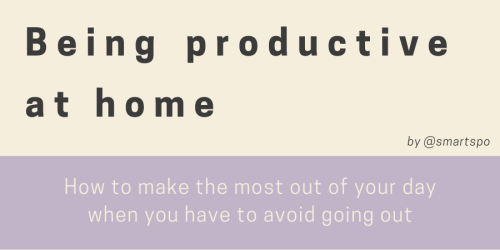
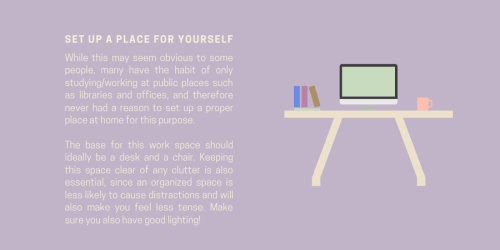
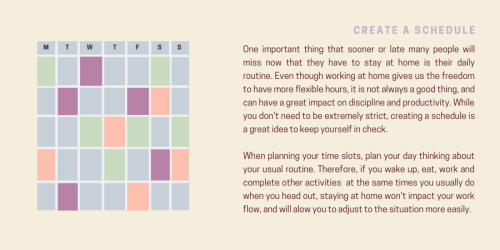
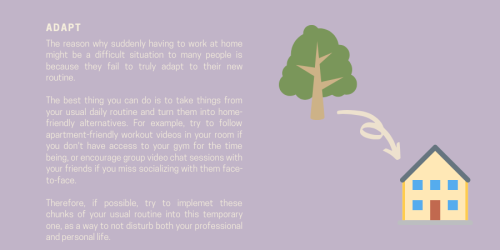
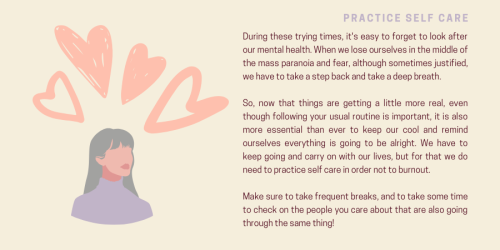
in the past, i had to prepare for several exams by self-studying for long hours at home, so over the years i’ve learned the best ways to adapt to this situation, which i now present in this little infographic. i hope it can ease some of the pressure! 💜
studygram